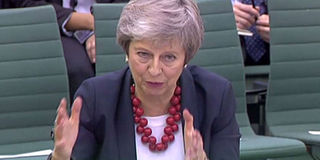Why we’re not about to see the end of the Brexit saga any time soon

A video grab from footage broadcast by the UK Parliament's Parliamentary Recording Unit shows Britain's Prime Minister Theresa May answering questions about her Brexit agenda at a Parliamentary liaison committee meeting on November 29, 2018 in London. PHOTO | AFP
What you need to know:
- The snap poll Mrs May called in May last year to unite the UK behind her and give her heft in negotiations with the EU instead wiped out the Conservative’s parliamentary majority.
- Labour wants the chaos in government and in the Conservative Party to escalate and culminate in a General Election its leader Jeremy Corbyn thinks he could win.
It has unleashed forces none imagined. It destroyed Prime Minister David Cameron. After teasing and torturing her reign ceaselessly, it threatens to send his successor, Mrs Theresa May, too to the political graveyard.
It triggered a snap General Election and has caused the resignations of many of Mrs May’s senior and junior ministers. It has split the government, the Conservative Party and the opposition Labour Party alike.
It has polarised the UK and gripped the attention of the European continent, Commonwealth and beyond. Many fear it could lead to the break-up of the United Kingdom and the European Union.
If you want to study and or paint politics as chaos and confusion, and the heads of government and opposition as the epitome of bumbling and trial and error, then, the UK offers a perfect tapestry and expansive canvass respectively.
AWARENESS
On Thursday, June 23, 2016, some 30 million Brits went to the polls to answer Yes or No to withdrawing from the EU.
The union is the world’s largest trading bloc; their biggest trading partner; their closest security allies via NATO and next door neighbours whose three million nationals live and work in the UK.
This referendum birthed the ubiquitous word Brexit as the poll, politics and process of exiting the union by March 2019.
By 51.9 per cent to 48.1 per cent, the Brits voted to quit the 44-year-old relationship. But no sooner had they spoken than they discovered that they did not know the meaning of “we want to control our borders, money and laws”.
Is it a hard Brexit that is, should London and Brussels part ways in a bitter divorce or should the two strike a deal for an amicable parting that suits and benefits both parties in a soft Brexit?
What does it mean for Scotland, which voted by 62 percent against quitting the EU?
IMMIGRATION
Should a hard border separate the two Irelands, one which is a separate republic and the other part of the Kingdom? And why should London pay Brussels some £39 billion to exit?
These issues are fought over to this day even after Mrs May thought she had won a deal to please all from Brussels on November 26. It made everybody unhappy.
Indeed, recent polling shows a growing number of Brits want another referendum (a people’s vote) and that it would be won by those who want the UK to remain (Remainers) in the union unlike the first which was won by the quitters (Brexiters).
Brexit was expected to end debate on EU once and for all. What happened? One, Mr Cameron believed Remain would win because Brits are intelligent people.
He did not reckon with the anti-immigrant wave at the time triggered by masses of refugees seen scampering on TV to enter Europe. Brexit was immigration-driven. Mr Cameron lost his own poll and resigned.
OPPOSITION
Two, Brits forgot the EU is rather like a club. When a member is withdrawing, its departure is governed by the club’s rules and not the wishes of the quitter.
Three, Brussels is keen to ensure Brexit does not set in motion exits that would break up EU. It has driven a hard bargain to deter future withdrawals.
Four, at home Mrs May faces opposition from Conservatives who want a hard Brexit (damn the consequences) who are opposed to those who want a soft Brexit, who don’t like her Brexit deal and those who want her to go because she is the problem and not Brexit.
After all, they charge, she does not believe in Brexit because she voted Remain.
Four, there’s Labour which, despite the chaos in its ranks over Brexit, wants the chaos in government and in the Conservative Party to escalate and culminate in a General Election its leader Jeremy Corbyn thinks he could win.
SNAP POLL
Five, the snap poll Mrs May called in May last year to unite the UK behind her and give her heft in negotiations with the EU instead wiped out the Conservative’s parliamentary majority.
Weakened, she relies on a confidence and supply agreement with the Irish Democratic Unionist party to govern.
Last, there is a vote in Parliament on Mrs May’s deal on December 11. She is campaigning, asking Brits to pressure their MPs to back her plan.
She wants a TV debate with Mr Corbyn which she snubbed last year. Still, only a last gasp miracle will win Mrs May the Commons vote. A new Brexit chapter beckons.





